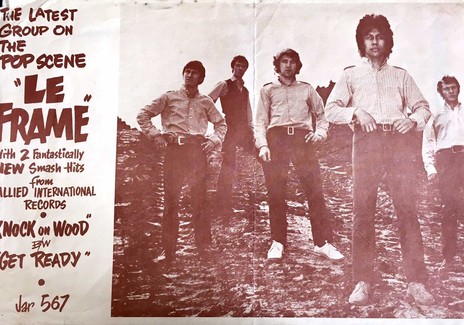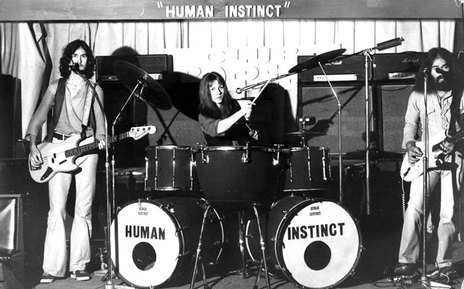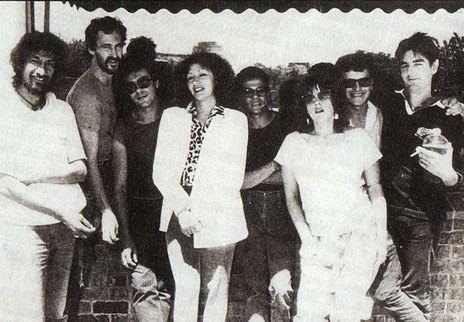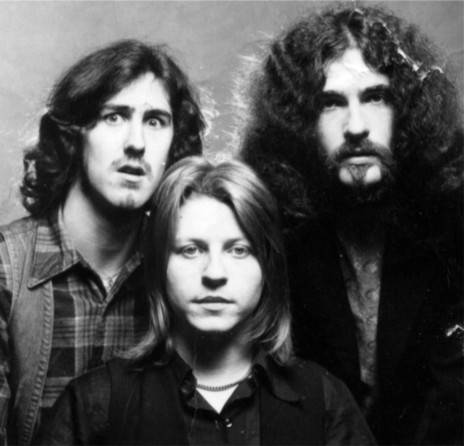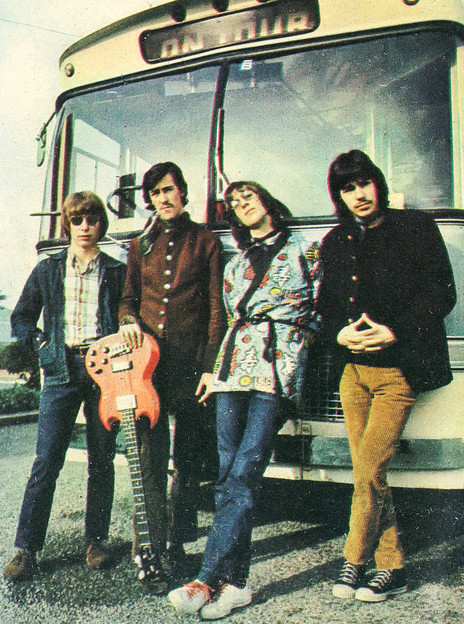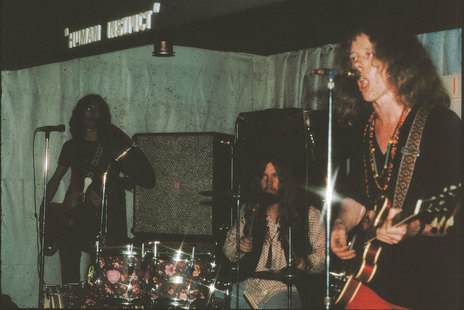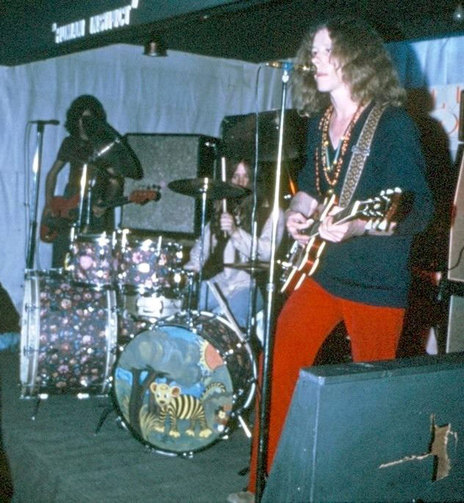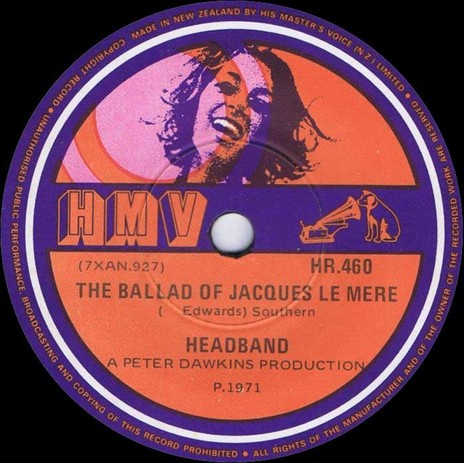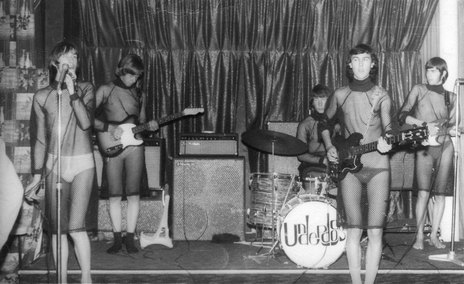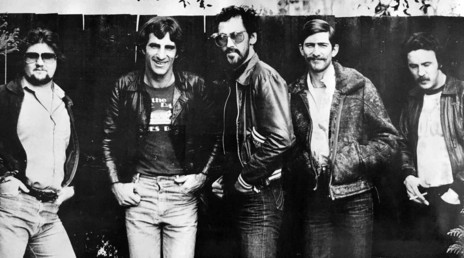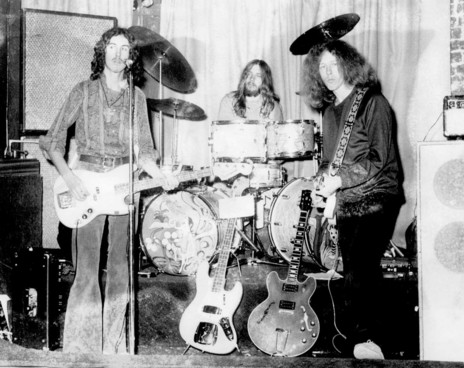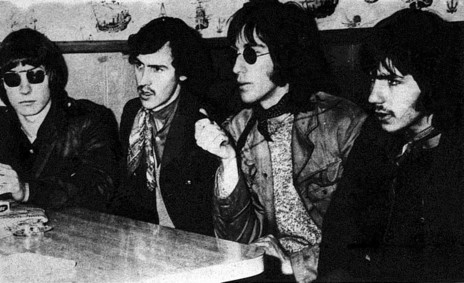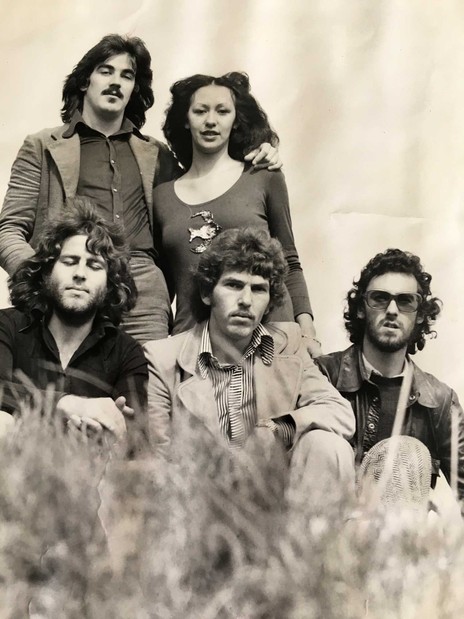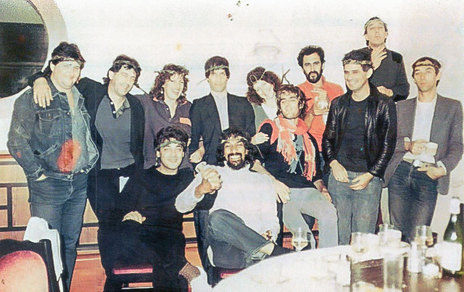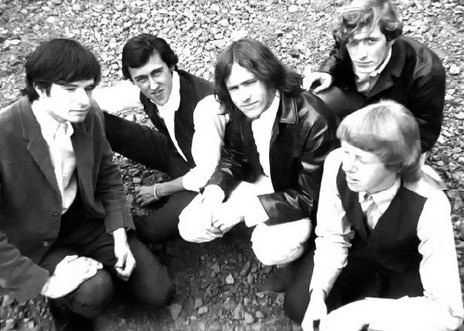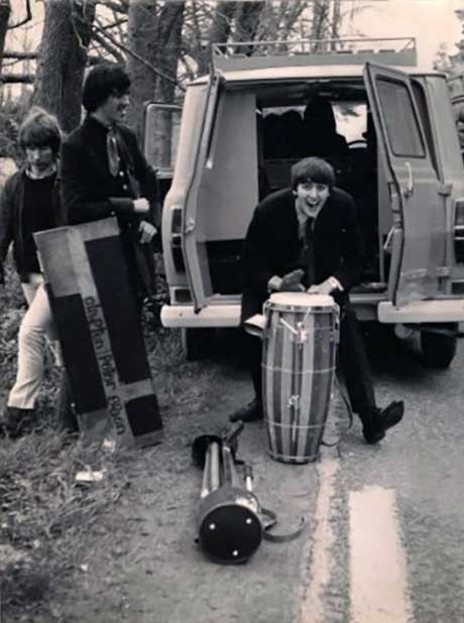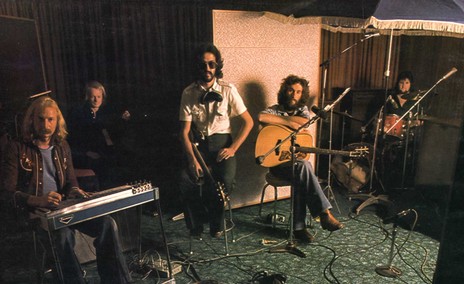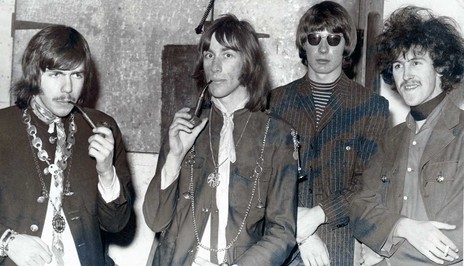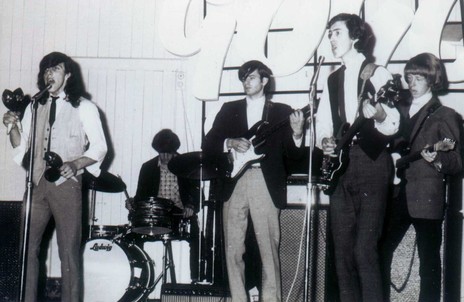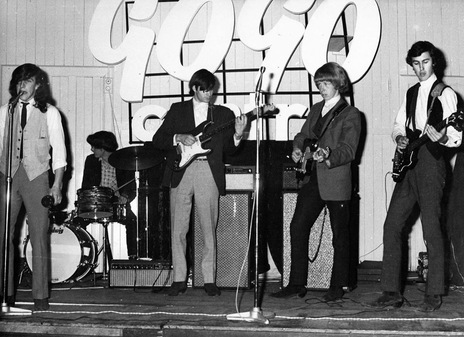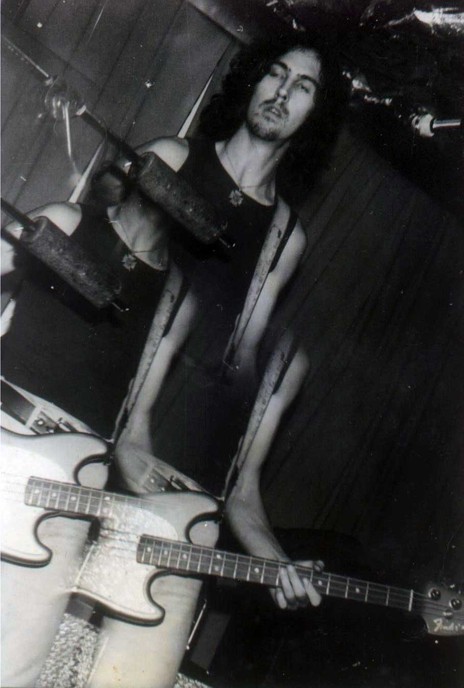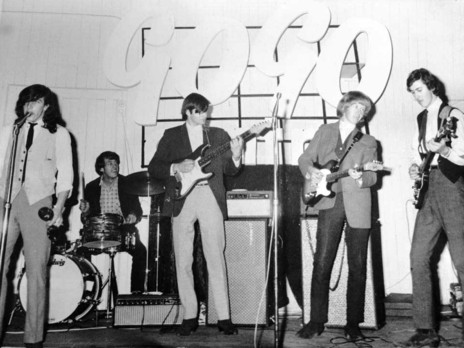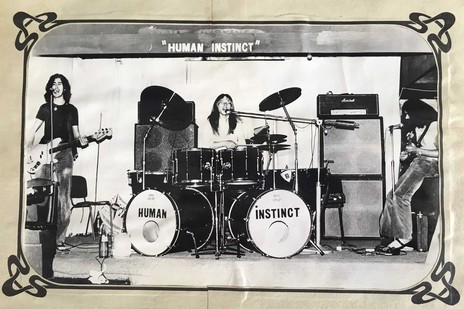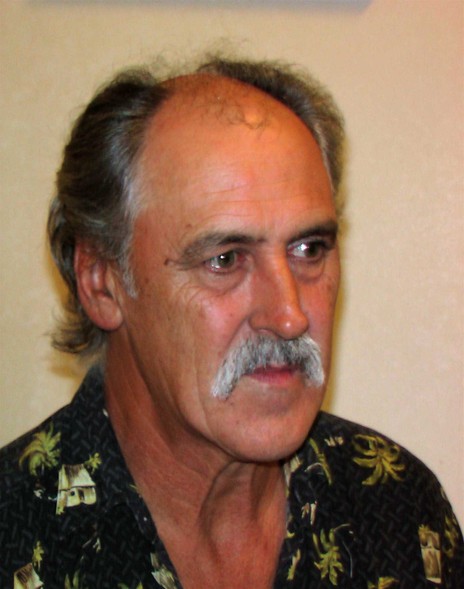This group of older musicians had kicked into life in McGee St, Otahuhu around 1962, where Archie Bowie and Harvey Mann from the Bay of Plenty had set up home and begun experimenting with skiffle music and the roots and rock sounds coming out of the USA and United Kingdom.
Bowie had been working up some mean vocal and harp sounds as he and guitarist Mann began leaning toward the early blues sounds of Big Bill Broonzie, Sonny Terry and Brownie McGhee, Jimmy Reed and Lead Belly and the emerging British rock sounds of the Rolling Stones, The Kinks, The Yardbirds and The Downliners Sect.
In 1963, Tony Rawnsley on rhythm guitar player and Gary Bartlett joined on drums and they were looking for a bass player to complete their rhythm and blues unit, which is where Neil Edwards came in. Bartlett never played live with the band and was soon replaced by Brian Everson.
Their first audiences were the party goers who would turn up at McGee St to hear the boys jam, always expecting there would be some kind of misbehaviour before the night was out.
Edwards recalls an early party trick with the wonky oven in the kitchen. They’d throw a can of fly spray in when everyone was settling down for some music and turn the oven on full. “About half an hour later there’d been this massive explosion and the door would fly off. Then we’d put the door back on and do it again.”
The band paid their dues playing dances at New Lynn RSA and guest spots on Sunday afternoons at the Top Twenty.
At 23, Archie Bowie felt he was a little old to be entertaining teenagers and quit, opening the way for two more experienced players, Ian Thomson on drums and Englishman Mick Sibley, who’d both been with The Dark Ages, on harmonica and vocals.
Underdogs eat competition
The Underdogs entered the Galaxie nightclub’s Battle of the Bands where around 10 hopefuls would turn up every Thursday. After the elimination rounds, the main contenders for the winning spot were The Boddys, The Soul Agents and The Underdogs. Both rival units eventually contributed members to the evolving Underdogs, who came out winners. The prize was the residency at the Galaxie. The music never stopped at the Galaxie, the second stage often featuring The Action or The La De Da’s.
By late 1966 The Underdogs featured Murray Grindlay from the Soul Agents on vocals and harp and former Boddys members Lou Rawnsley on guitar, replacing his brother Tony. Tony Walton was on drums.
The band were being groomed for success by Eldred Stebbing who owned the Galaxie nightclub and had a stable of artists including The Pleazers and The La De Da’s. “He tried to clean us up and made us wear ties so we looked respectable. He had a hard job,” says Edwards.
The Underdogs ended up playing seven nights and three afternoons for 15 pounds a week – a lot of money for “a bunch of 17-year old kids”. The band was also booked to play 12-2pm Monday, Wednesday and Friday. “There were no supermarkets or malls so everyone came into Auckland city at lunchtime.”
Stebbing wanted The Underdogs to be more commercial but they were determined to find their own style that was more aligned with the blues and heavier British rock.
After playing band members would head to the movies or go through the record shops looking for new songs. The rest of the week was dedicated to rehearsals at the club from about 5pm onwards. “We had in excess of 100 songs in our repertoire,” says Edwards.
Stebbing wanted The Underdogs to be more commercial but they were determined to find their own style that was more aligned with the blues and heavier British rock, adding covers from The Who, Cream and Hendrix to their repertoire. “He’d try and get us to play pop songs off the radio but all the bands were doing that.”
The Underdogs struck a compromise with Stebbing who allowed them to record a raw energy cover of Don Covay’s See Saw, which they’d dug out of the bargain bin at a local record store. It was released in February 1967 on Zodiac, cementing their reputation as one of the hottest bands on the Auckland scene.
No respectable ties
The directive to wear ties and keep the act respectable soon wore thin. The band took their lead from their peers in the British rock revolution with stage outfits becoming an eclectic mix of military coats, kilts, Carnaby St fashions and unusual props.
A second single, a cover of John Mayall’s ‘Sitting In The Rain’ was released just ahead of the C’mon 67 tour. Despite the commercial and laid back nature the band continued to experiment not only with drugs and outrageous stage behaviour but with their sound.
Former band member Tony Rawnsley had built a fuzz box and effects pedal for the band which had been used on ‘Sitting In The Rain’ but guitarists Lou Rawnsley and Harvey Mann both wanted to use it. “Basically it was a petty squabble,” says Edwards.
Harvey Mann was always looking for “new musical horizons” and had been hanging out with ace guitarist and experimental whiz Doug Jerebine, whom he joined up with as bass guitarist in a recently formed unit, The Brew.
At the opening of the C’mon 67 concert tour with Pete Sinclair at the St James Theatre in Christchurch, about 1,500 kids sat patiently through the performances of Sandy Edmonds, The Chicks, Herma Keil (Keil Isles) and Sonny Day, waiting for teen idol Mr Lee Grant.
First wild food festival
Following the interval The Underdogs appeared. John Dix, in his book Stranded in Paradise, takes up the story. Edwards says 80 percent of it is true:
“Four teenagers aged between 16 and 18 … attired in an assortment of fancy dress, including kilts and firemen’s uniforms … stroll on stage half tanked and fully stoned wearing jeans, T-shirts and Cuban-heeled boots … clutching their newspaper wrapped supper. Greeted by a wall of screams, they stand there for a full two minutes, scoffing their food and looking out at this spectacle, joking amongst themselves and pointing out the more enthusiastic members of the audience. The band are just standing there eating and the crowd is going crazy. These fans are hungry for action and … Hungry? Well why not feed them? So The Underdogs start throwing fish and chips into the audience, and the audience goes berserk.
“... the madness continues. Bass player Neil Edwards, straw in mouth, is sucking on a milk shake. But no! He doesn’t drink the contents he sprays the front row! Suddenly he empties the contents over his head and proceeds to roll around the stage until his hair is a gooey mess. By now the whole C’mon entourage is side-stage watching and wondering what the hell is going on.
“Eventually the band picks up instruments and let rip. Guitarist Lou Rawnsley plugs in his Fender Mustang complete with home-made fuzz box, and with volume up full throttle and a deliberate ear splitting feedback, out comes this long sustained roar, all anger and distortion. Meanwhile drummer Tony Walton thrashes around with little regard for the actual song … Neil Edwards is playing bass one-handed, using the other to wave to the masses. Vocalist Murray Grindlay forgoing the microphone demonstrates his agility by performing cartwheels across the stage. By the time the C’mon 67 tour was over the Underdogs had barely survived numerous threats to have them replaced, more for their off-stage behaviour rather than their crazed performances. They were wild boys.”
The tensions and arguments between band members had a lot to do with the C’mon show tour. There was nowhere to rehearse and their extensive repertoire was suffering as they were only playing three or four songs a night for two months.
“We were all easy to get on with but there were a lot of pressure on us. We were getting quite a bit of money but blowing it and getting into the drugs and the party lifestyle. We were also having a musical difference of opinion. Murray and Lou want to do more blues and were making something of a crusade out of it. I wasn’t into that,” says Edwards.
Back in Auckland, Eldred Stebbing had his eye on moving The La De Da’s from the Platterack into the resident spot The Underdogs had held at the Galaxie. The Underdogs went on another tour with entrepreneur Bari Gordon (Bari & The Breakaways) and Le Frame to try and capitalise on their latest single and then they were supposed to go to Australia.
Eventually, Edwards got the boot and the rest headed back to Auckland. Fortuitously Le Frame bass player Michael “Boogie” Harrison had just quit, creating an immediate opening.
Edwards does soul
Le Frame were a rhythm and soul outfit which kicked off in 1966 with Fred Bower on lead guitar and vocals, Max Wolfgramm on keyboards and vocals and Mike Donnelly (The Soul Agents) on drums. The repertoire was a refreshing change, stretching Edwards’ skills in a new direction playing Sam & Dave and Four Tops covers. The band recorded one single with Edwards on board, a version of ‘Knock On Wood’.
There were a number of line-up changes but he stayed to the end when Le Frame was reduced to a trio with Bower on guitar and Glenn Absolum on drums. Edwards had first met Absolum as a ‘stand-up drummer’ in the Galaxie Battle of the Bands, playing with a group called Steve Warwick and The Speck.
The trio moved across to Melbourne and changed their name to Mantra, signing with the Michael Browning agency which was also representing The La De Da’s and half a dozen other top Australian bands.
Browning also represented New Zealand band Compulsion, featuring Reno Tehei, Paddy Beach, and Ben Kaika. But their star was fading after having been paraded around Australia as a JImi Hendrix covers show.
The trio’s time in Melbourne was short-lived. Edwards says there was plenty of work, the bills always got paid, there was a great PA system but the band never seemed to have anything for themselves. They got fed up and disappeared to Sydney with the transit van and PA and signed up with the Cordon Bleu booking agency.
They began playing underground gigs at the Randwick Town Hall, Caesars Palace, The Hawaiian Eye, the Cheetah Room and Lucifer’s nightclubs.
Browning tried to get Fred Bower to return to Melbourne but he refused. It was then the jilted promoter played his ace – he’d struck a deal with Bower’s probation officer back in Auckland and when the guitarist failed to deliver, he had him deported.
Edwards and Absolum then teamed up with former Action guitarist Mike Wilson in Surfer’s Paradise but their music didn’t suit that scene and work was hard to come by. Looking to become a band, the rhythm section headed back to Auckland.
In their absence, The Underdogs Blues Band album had been released – a compilation of six songs recorded up to a year earlier at Stebbings when Edwards was still part of the band.
The Underdogs had gone through a series of line-up changes and finally gone into a holding pattern. George Barris from The Bitter End had replaced Edwards on bass and Dave Orams, former Breakaways bassist, had tried out on keyboards. Tony Walton was replaced on drums in mid-1968 by Le Frame’s Doug Thomas (also from The Breakaways) and Chaz Burke-Kennedy joined on guitar for a time.
In October 1968 they recorded a Frank Zappa cover, ‘You Can Take Your Clothes Off When You Dance’, promptly re-titled ‘There Will Come A Time’ to get past the censors.
Vocalist Murray Grindlay had left to join former band mate Harvey Mann as The Brew dissolved, and they became The Australasian Blues Champions, which also folded in early 1969. Guitarist Doug Jerebine headed off to England and Grindlay jumped the Tasman.
That left Harvey Mann. The return of Absolum and Edwards was the perfect opportunity to revive The Underdogs. The Brew’s co-founder Bob Gillett joined on saxophone and Andrew Parata was recruited on vocals. However, Parata’s sexually charged Jagger-like stage gyrations were an embarrassment to Mann and to conservative crowds in places like Hamilton.
Andrew Parata was sacked and Bob Gillett left shortly after, leaving the trio Pig (Absolum), Mann and Edwards to tour the country for over six months.
Working like a dog
This incarnation of The Underdogs quickly gained themselves regular work at Club Bo Peep in Auckland. With Frank Greer as manager they were soon on a relentless circuit up and down the North Island. Frank provided them with a van and The Human Instinct’s roadie Wayne Carr.
They’d play Monday and Tuesday at the Bo Peep, Wednesdays in Rotorua, Thursdays in Palmerston North, Friday and Saturday in Wellington and be back in Auckland to start all over the following week.
The band built a strong following in Wellington where they played Dick Turpins Disco, Ali Baba’s and became resident at Lucifers for several months, often double billing with Kal-Q-Lated Risk, Rebirth, Craig Scott, Highway, The Movement or Fresh Air.
Whenever they were back in Auckland they had a regular gig waiting at Bo Peep in Durham Lane. In October 1970 they were special guest at a preview of the material Human Instinct were about to record for their second album Stoned Guitar.
That month The Underdogs got the go ahead to record their new album Wasting Our Time (as Pig, Mann, Edwards), for Pye. Produced by Bob Gillett, it was recorded at Mascot Studios and finally released in February 1971.
As Club Bo Peep morphed into Granny's and the Greer brothers opened their new club Molly Hatchetts in Cook St, The Underdogs moved with them as a star attraction alongside Maurice Greer’s Human Instinct.
However, issues were arising within the trio that ran a little deeper than the “silly family squabbles” of the past. This time it was “religious”. Edwards admits he didn’t did have a lot of patience for the growing Hare Krishna influence and the direction devotee Mann and new recruit Absolum were trying to take the band.
He was again “sacked” and he and Human Instinct bass player Larry Waide essentially swapped roles. Waide’s term with The Underdogs was short-lived; they changed their name to Space Farm and replaced him with Billy Williams on bass until 1973, when Harvey began to focus solely on the Krishna movement.
Instinct for survival
The invitation to join The Human Instinct was welcomed by Edwards. Not only would he have the challenge of working with a new band, this group actually had a roadie, a van and better equipment. The band continued to make regular appearances at Bo Peep and Hatchetts, delivering a solid sound through the Marshall equipment Maurice and Frank Greer had brought back from the UK, and Edwards’ 200 watt Marshall amp and four quad boxes.
The Pins In It album was recorded between February and May 1971. It was very different from the first two raging guitar blown LPs and a surprise to many fans with some tracks falling into the country rock genre.
Apart from Pink Floyd’s ‘Nile Song’ (written by Roger Waters) the track listing comprised three Billy TK compositions and several from Neil Edwards including the title track ‘Pinzinet’ with lyrics from Omar Khayam’s Rubayat, ‘Duchess of Montrose’, first recorded by The Underdogs, the zany ‘Washing Song’ and ‘Rainbow World’.
The band were invited to tour Australia and given every opportunity to jump straight on to a well-organised circuit that could have helped them crack that market.
After playing Whiskey A Go Go in Sydney, being sacked from Chequers for inappropriate language, appearing in Blacktown, on Channel 9’s GTK TV show and completing gigs in Brisbane, the trio were struggling with personality issues and musical direction.
When Greer announced they were heading back to New Zealand after less than a month Billy TK said he wouldn’t be joining them.
Rather than an elated crew able to boast they’d cracked the Australian scene it was a dejected and broke duo and hangers-on who boarded the cruise liner, with hardly enough money between them to buy a drink.
“What we had was a drummer who was drinking and a stoned guitar player. I was in-between so I got drunk and stoned.”
– Neil Edwards
That in itself was a tragedy for the hard drinking players who felt like they needed to drown their sorrows. Fortunately some fans on the boat shouted them at the bar all the way home. It was the end of an era for The Human Instinct, who had to quickly find a replacement player to maintain their residency at Molly Hatchetts club in Auckland.
Edwards recalls that substance abuse was at the core of growing tensions in Australia. “Maurice and Frank decided they didn’t want anything to do with dope smoking. However, Billy had just discovered marijuana. What we had was a drummer who was drinking and a stoned guitar player. I was in-between so I got drunk and stoned.”
Maurice and Neil Edwards began looking for a third member, settling on keyboardist and vocalist Graeme Collins, who played on the 1971 single ‘Texas Sparrow’ b/w ‘Children Of The World’, co-written by Edwards, who played bass and acoustic guitar on it.
Collins was replaced by ex-Fourmyula guitarist Martin Hope which gave the trio a new lease of life ahead of their fourth album Snatmin Cuthin, an anagram of the band name.
Sloggin’ for the blues
When The Human instinct was parked up for a while as Maurice Greer concentrated on building and running nightclubs with his brother Frank, Edwards joined up with the saxophonist and musical arranger Jimmie Sloggett.
Sloggett and his band had a residency backing floorshows at the popular Logan Park venue in Greenlane. “It was my turn to start learning and reading the fly shit stuff. In this band you had to read so I had a crash course,” says Edwards.
He then accepted a residency at the El Matador with Brian Henderson (C’mon showband, Keil Isles) on keyboards and Ricky Ball (The Challenge, Ticket and later Hello Sailor) on drums but soon tired of the repertoire: “ ‘Guantanamera’ and ‘Girl from Ipanema’.”
He jumped at the chance to play with Sonny Day on guitar and vocals, Johnny Banks (Karma, Troubled Mind) on drums, and Tommy Ferguson on vocals in the Goodtime Band, which took up residency at the Hillcrest Tavern in Hamilton.
In 1976 Edwards became a member of Tommy Adderley’s reformed Headband for a short time, including playing on their final and much underrated Rock Garden album.
In the years since then, Edwards has rarely been without an active band. He’s been a member of Sonny Day and the Renegades; Sonny Day and Breeze which also featured Bob Gillett, Chaz Burke-Kennedy and Doug Thomas, and All Stars Play The Blues, which included Sonny Day, Midge Marsden and international guests Stevie Ray Vaughan and Wilko Johnson. (The All Stars Play The Blues concert was filmed at Mainstreet, Auckland in November 1984.)
Neil Edwards replaced Bob Jackson on bass in Larry Morris’s Shotgun for a year, appeared in the Teddy Boys, then took over from John Thompson in the Willie Dayson Blues Band, playing on their album Rogues & Fools.
He joined Dayson, Mike Farrell and Mike Abbott in National Grid, was a member of Truda and the Lonely Ones (with Truda Chadwick), the Kybo Gliderz, resident act at the Westward Ho in Kelston, and in variations of Rainbow which included Josie Rika, Paul Woolright (Ticket and later, Hello Sailor), Len Whittle (Troubled Mind) and Ricky Ball.
Neil Edwards spent seven years with the Red House Rockers and was in punk band The Misunderstood. His band The Rockin Lockins were regulars at his own bar the Java Jive in Ponsonby for several years.
Edwards re-joined Human Instinct founder, drummer and singer Maurice Greer in 1978 in the Rizzo Band at Jilly’s nightclub in Auckland and the two friends became rhythm section for touring American guitarists Lenny Capello and Michael Bagley in Rockett 88.
Greer and Edwards continued to play and record together in various iterations of The Human Instinct in the 21st century, including the Midnight Sun album, a reprise of older Human Instinct hits including those written by Doug Jerebine with a few extras thrown in.
“Neil was a real backbone to what I was doing, keeping me steady not only with his bass playing but with his personality too. He’s proved that because he’s continued to take on jobs with lots of responsibility as a construction site manager, an air conditioning engineer, running Java Jive nightclub in Auckland and raising a family,” says Greer.
Edwards’ songwriting contributions to the New Zealand soundtrack include APRA nominees ‘Only Truly’ (1973) written for Tommy Adderley, ‘The Ballad of Jacques la Mere’, a hit for Headband in February 1972 and reinterpreted on The Human Instinct’s Snatmin Cuthin album, and ‘Rainbow World’, the B-side of ‘Highway’ (Billy TK) a single taken from Instinct’s Pins In It album with lyrics written by Neil’s mum.
